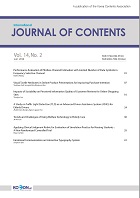- 권한신청
- P-ISSN1738-6764
- E-ISSN2093-7504
- KCI
 ISSN : 1738-6764
ISSN : 1738-6764
The Paradox of Public Diplomacy on the Web: An Empirical Analysis on Interactivity and Narratives of Nation-States’ Ministry of Foreign Affairs Web Sites
Kevin Y. Wang (Butler University)
Yejin Hong (University of Minnesota-Twin Cities)
Abstract
Against the backdrop of Habermas’ theory of communicative action, we empirically analyzed the level of interactivity and narratives offered in nation-states’ ministry of foreign affairs Web sites. A multiple regression analysis was performed in an attempt to identify factors affecting the level of interactivity in such Web sites. Findings revealed that the level of economic development is the sole significant factor in regards to the level of interactivity. Further, self-interested, goal-directed, and strategic purposes behind the allegedly transparent, engaging, and interactive public diplomacy were evidenced through a critical analysis of the objectives, key issues, and target publics addressed and highlighted in the public diplomacy narratives on the Web. The results suggested a possible digital divide in the interactive adoption of Web public diplomacy as well as strategic motives and interests embedded in the public diplomacy communication on the Web. This study helps increase our understanding of the paradox of public diplomacy in the digital age.
- keywords
- Public Diplomacy, World Wide Web, Strategic Communication, Interactivity, Digital Divide, Critical Analysis.
- 다운로드 수
- 조회수
- 0KCI 피인용수
- 0WOS 피인용수

